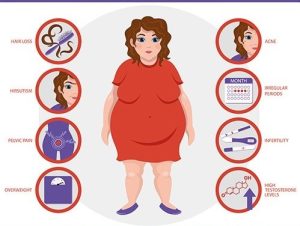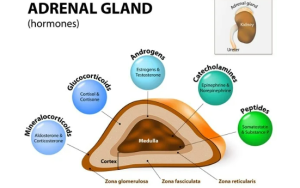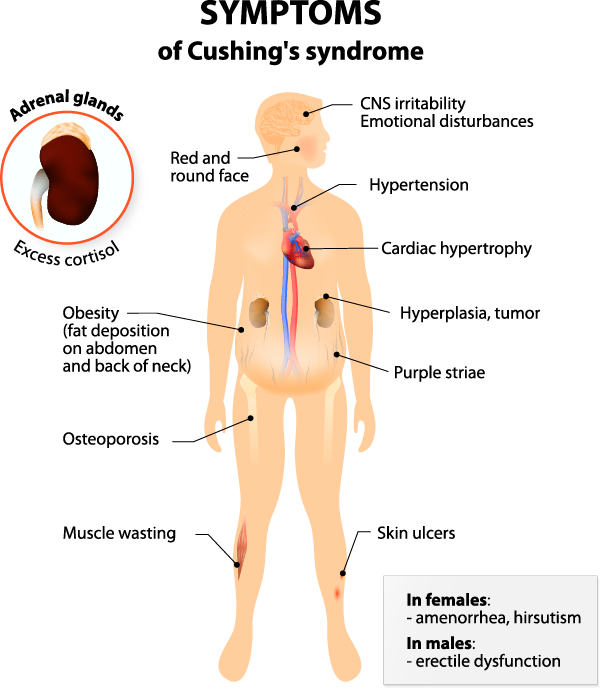For some women, hair growth on the face, chest, and other parts of the body is a significant cause for alarm. This condition, called hirsutism, can affect any female at any age, but you’re more likely to experience it if you have a family member who has also been diagnosed with it.
It is important to see a medical expert if you have this condition. Meanwhile, below are the possible causes of your hirsutism:
 Polycystic ovary syndrome: This is the most common cause of hirsutism in women. Individuals living with obesity, and those who have a family history of the condition, are at a higher risk of developing PCOS. PCOS is a condition that affects a woman’s hormone levels and it is characterised by irregular or no menstrual periods, obesity, fertility difficulties, and excess hair growth.
Polycystic ovary syndrome: This is the most common cause of hirsutism in women. Individuals living with obesity, and those who have a family history of the condition, are at a higher risk of developing PCOS. PCOS is a condition that affects a woman’s hormone levels and it is characterised by irregular or no menstrual periods, obesity, fertility difficulties, and excess hair growth.
Medications: Some medications, including steroids, and testosterone, can lead to excessive body or facial hair growth.
 Adrenal gland disorders: Adrenal gland disorders are caused by problems with the glands themselves that cause overproduction or underproduction of hormones. The adrenal glands, located just above your kidneys, are responsible for hormone production. Certain adrenal gland disorders include adrenal cancer, adrenal tumors, congenital adrenal hyperplasia, and Cushing disease.
Adrenal gland disorders: Adrenal gland disorders are caused by problems with the glands themselves that cause overproduction or underproduction of hormones. The adrenal glands, located just above your kidneys, are responsible for hormone production. Certain adrenal gland disorders include adrenal cancer, adrenal tumors, congenital adrenal hyperplasia, and Cushing disease.
Adrenal cancer is a rare cancer that begins in one or both of the small, triangular glands (adrenal glands) located on top of your kidneys. Adrenal glands produce hormones that give instructions to virtually every organ and tissue in your body. Signs and symptoms of adrenal cancer include hormone changes in women that might cause excess facial hair, hair loss on the head and irregular periods, weight gain, muscle weakness, and others.
Congenital adrenal hyperplasia is a group of genetic disorders that affect the adrenal glands, a pair of walnut-sized organs above the kidneys. The adrenal glands produce important hormones, including androgens, and cortisol. An excess of the male sex hormone androgen can result in short height and early puberty for both males and females. Pubic hair and other signs of puberty may appear at a very early age. Severe acne also may occur.
 Cushing disease occurs when your body makes too much cortisol, a hormone related to the body’s stress response. It’s a rare pituitary disorder that is progressive. That means that without treatment, it gets worse over time. With treatment, patients can lead active lives with fewer symptoms.
Cushing disease occurs when your body makes too much cortisol, a hormone related to the body’s stress response. It’s a rare pituitary disorder that is progressive. That means that without treatment, it gets worse over time. With treatment, patients can lead active lives with fewer symptoms.
Idiopathic hirsutism: Idiopathic hirsutism is hirsutism without a known cause. It may be a mild variation of PCOS, but more research is needed to understand this area. Idiopathic hirsutism and PCOS are treated in similar ways.
Managing hirsutism
If you are obese, your doctor may suggest losing weight to reduce the symptoms of the condition. Because obesity can change the way your body produces and processes hormones, maintaining a moderate weight may correct your level of androgens without the use of medication.
If the condition is a symptom of PCOS or adrenal disorders, you may need additional pharmacological treatment. Drug therapy in the form of birth control pills and anti-androgen medications can help balance your hormone levels.
Hair removal techniques are a non medical way to manage excessive hair but some people use them to keep their legs, and underarms free of hair.
It is, however, important to see a medical expert for the best preventive, management, and treatment measures.


